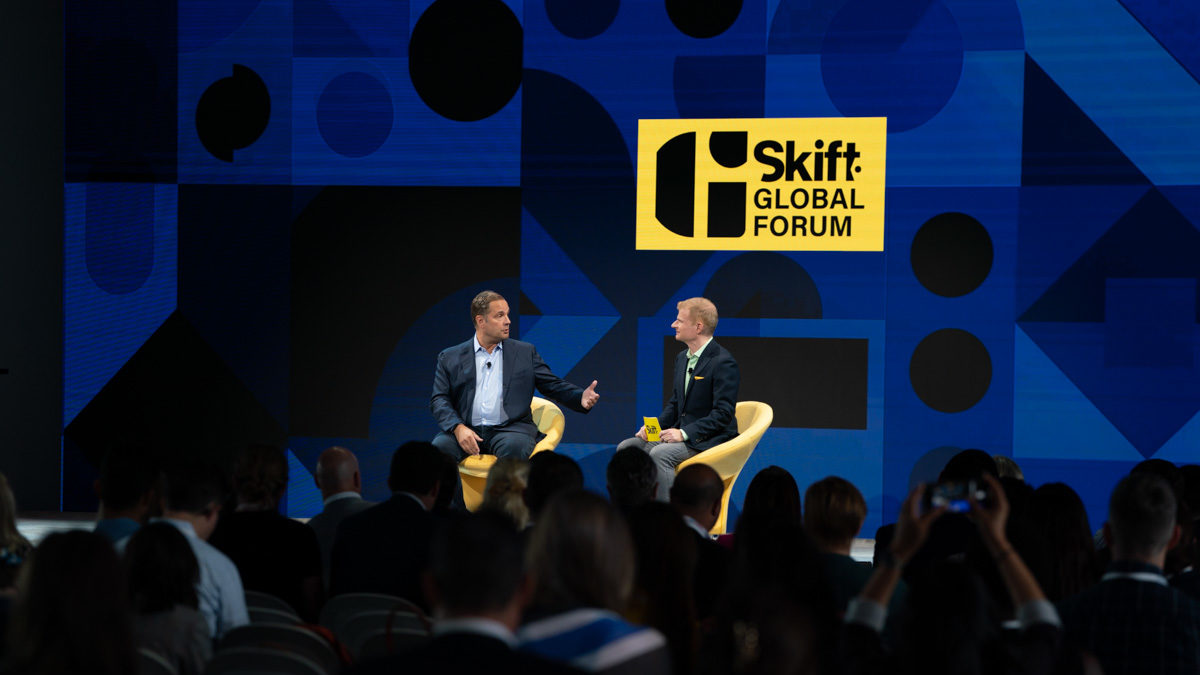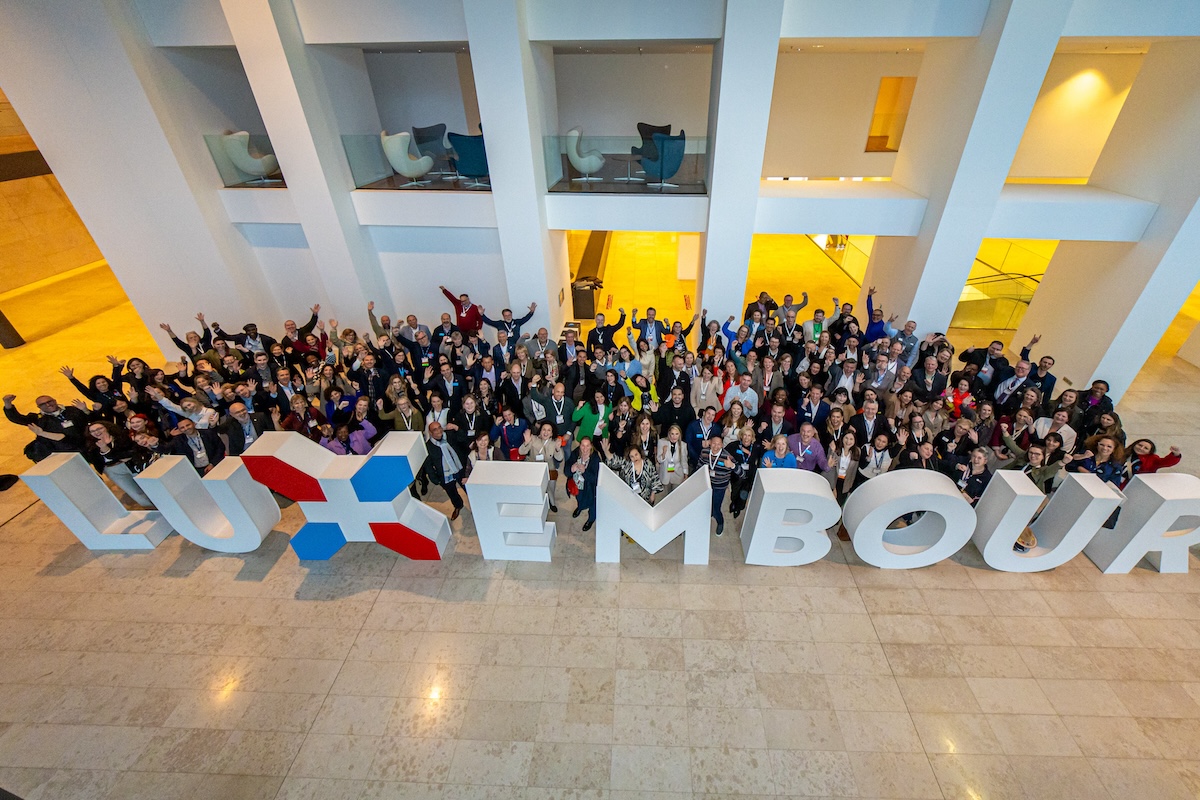Skift Take
It is only natural that a company like Skift has a dynamic event that reflects its brand ethos.
The most successful events bring a brand to life, which is what Skift Global Forum, the flagship global conference on the business of travel, did.
Attracting some of the most progressive minds in the travel industry, this is a gathering where cutting-edge knowledge is the star. “This is not a run-of-the-mill boring trade show where vendors talk to vendors, and no one learns anything,” said Rafat Ali, Skift CEO.
One Focal Point
There isn’t a labyrinth of exhibit booths or multi-person panels going on simultaneously here. Only one main stage. The star of the show – knowledge.
“It is a single-stage experience that brings to life the power of story. That is what drives the emotional connection that people remember,” said Brian Quinn, head of programming at Skift. “People who read Skift every day are part of our community, and the intrinsic value of the Global Forum is the opportunity to bring them together around new ideas.”
Why a single stage? So everyone gets the same experience. “Everyone’s take on the subject may be different, but they all hear the same speaker simultaneously,” said Ali.
Condensed and Diverse
Respecting the reality of today’s world where work and personal lives merge, the conference was only a day and a half to allow attendees to enjoy New York City or fly home early.
Approximately 700 people from across the globe gathered in The Glasshouse, a new venue in New York City, with another 800 attendees online. There were 550 companies from 56 countries represented with more than 22 sponsors, the most ever.
However, there was some uncertainty going into the event. Keeping with the industry trend the entire meetings and events industry is experiencing, attendance was down compared to previous Skift events. “We were at 70 percent. I am happy about being a little bit above the industry average, but the reality is we can’t fight the macro trends,” said Ali. There was a surge in sponsorships which offset this shortfall in attendees.
A wide range of travel industry leaders, including 15 company founders, chairpeople, and CEOs, engaged in short, high-impact sessions with Skift editors. Creative, curious, and compelling voices were featured — think TED Talks of travel.
Inspiring Environment
Matching Skift’s forward-thinking, modern and innovative brand, The Glasshouse was light, airy, and modern in aesthetic. Outdoor terraces were a hit as attendees chatted during breaks, enjoying the superb September weather and 360-degree views. In its marketing material, The Glasshouse is described as a canvas without bounds, precisely what Skift Global Forum calls for.
Much like the popular format of TED Talks, each session lasted just 20 minutes, and the most common format was a conversation, not a speech. “It’s no secret that attention spans are shorter than ever, and that is why we keep our sessions brief,” said Ali. “We keep it punchy and fluid.” He also adds that if a speaker doesn’t resonate, there is no need to leave the room as it will be over quickly, and the next speaker may be more appealing.
Skift uses conferences to bring its work to life, explains Ali, who shuns box-like facilities favoring aesthetically-pleasing venues instead. For instance, last year, it hosted a comeback event in the TWA Hotel at New York’s JFK Airport after being grounded for a year because of the pandemic. Over 300 gathered in this jet-age classic property, a reincarnation of the landmark 1962 TWA Flight Center designed by legendary architect Eero Saarinen, with much of its original Jet Age glamour left intact.
Similarly, you will never find a row of silver chafing dishes serving rubbery chicken at a Skift gathering. Instead, healthy, easy-to-maneuver small portions with well-labeled ingredients are served, making it easy to chat with others during the breaks. Presentation is just as important as taste.
Some overlook event branding during a gathering — a missed opportunity. Skift yellow was subtly splashed throughout, from cocktail napkins to throw pillows to Ali’s trademark sneakers. Many Skift staffers wear some sort of yellow, with socks a particular favorite, and many attendees join as well. “They say they want to be part of our ethos. Many come dressed in fashionable, cool, casual clothes.” Then there are the iconic Skift yellow chairs on stage.
Ali was particularly proud of the feedback he got this year about his team. “One attendee said the Skift team is very switched on and in sync with each other, which I thought was just great,” said Ali.
A Skift soundtrack was woven into the event, setting the tone with modern global tunes. Curated by Ali, he shared it with all on social media.
Always Room for Improvement
There were some components of the forum that Ali plans to improve upon. An educational conference in focus, he feels there can be more orchestrated networking events for attendees. Tweaks will also be made to next year’s opening reception. Although the unobstructed view of the Empire State Building was a highlight, Ali did not like the group milling about in two separate rooms. “Keeping with my philosophy of a single experience for everybody in the room, we split the audience into two different parts, not on brand for us. These are all things you learn along the way and things we must solve before the next event.”
The Skift Global Forum app can also use some streamlining, said Ali. Some commented that they didn’t get the names of attendees until right before the conference. “The reality is almost 70 percent of our tickets were sold in the last two to three weeks. Releasing an app with not enough names is an issue we have to solve,” he said
Quality of Content Is Top Priority
The content was intriguing from start to finish. Mariana Oleskiv, the chairperson of the State Agency for Tourism Development of Ukraine, delivered a powerful message emphasizing that tourism will be vital to revitalize the Ukrainian economy, as well as a call to action to the industry for support. “Russia is fighting for the past, and Ukraine is fighting for the future, and the future will win,” she stated powerfully, bringing the audience to its feet.
The first day kicked off with a chat with Glenn Fogel, CEO and president of Booking Holdings, the world’s leading online travel and related services provider. Expedia Group and IAC Chairman Barry Diller was a headline-grabber, especially when he referred to working from home as “a crock.”
The last session of the event was packed as Brian Chesky, co-founder and CEO of Airbnb, shared his vision for travel’s future in conversation with Ali. As the revolution in how we live and work continues and the lines between life and travel continue to meld, he, too, is living in Airbnbs in all parts of the country. How’s that for living the brand?





